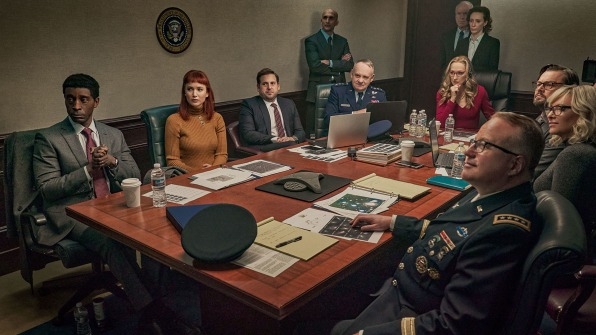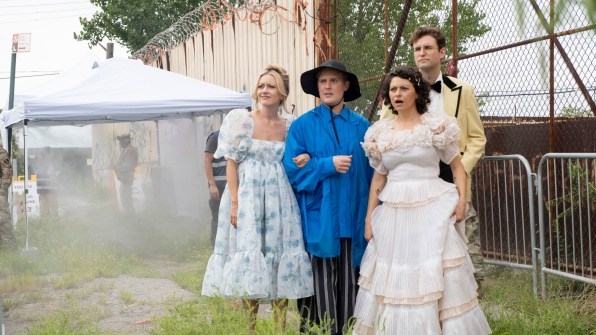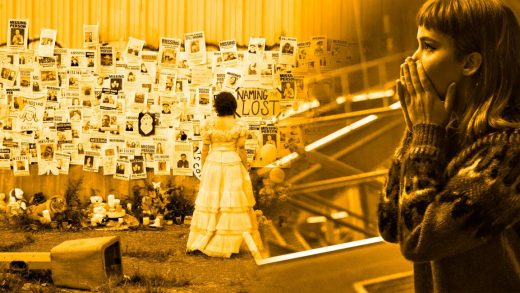‘Don’t Look Up’ and ‘Search Party’ offer competing visions of end-times satire
“They would never do that,” one might say, from the comfort of quarantine, watching actors whose nostrils have become docking stations for cotton swabs. “That’s so us,” one might tweet, taking in a fictional depiction of social media activity around a planet-destroying asteroid. It’s cold comfort to take a little break from the apocalypse to interrogate apocalyptic satire. A pair of recent entries in this bleak subgenre offer competing visions of our climate- and COVID-19-ravaged moment—and implicate viewers in different ways.
Netflix’s Don’t Look Up hit the Twitter discourse in the last week of December like a star-studded asteroid. Nobody was safe from the takes, least of all the film’s creators, who went heavily on the defensive. For anyone who missed that conversation, Don’t Look Up is director Adam McKay’s chaotic allegory about climate change; an Armageddon-esque disaster comedy about the hydra-headed monster of politicians, corporations, and media outlets thwarting scientific efforts to alert the world of its impending doom.
While Don’t Look Up lobs barbs at the powerful few standing in the way of properly addressing our existential threat, it saves its more cutting critiques for those following along at home. The daytime TV hosts played by Tyler Perry and Cate Blanchett may get paid to be vapidly sunny about the asteroid, after all, but at least they have agency. The show’s millions of viewers belong to a digital scrum of cattle-like consumers who exist to mindlessly chew content like cud. Don’t Look Up’s biggest blind spot is the smugly condescending way it scolds those audience surrogates for simply not looking up to confirm the problem.
The unwashed masses in Don’t Look Up are mostly glimpsed through the lens of social media. They share primitive memes about a millennial scientist (Jennifer Lawrence) who freaks out when those daytime TV hosts patronize her during an appearance on their show. They accidentally shoot bottle rockets at their faces while participating in a #LaunchChallenge on Instagram, to commemorate an effort to attack the asteroid. Only when the rocky mass is actually visible without a telescope do internet dwellers finally take it more seriously and start hashtagging #JustLookUp. In the world of this movie, the fate of the planet seems to hinge on whether people meme hard enough, in the correct way, before it’s too late.
Don’t Look Up is at its best when exploring more complex positions than “just look up” and its titular opposite chant, which Meryl Streep’s soulless president character adopts as a catchphrase. The parents of Lawrence’s scientist, for instance, are “for the jobs the comet will provide,” while Chris Evans’s fictitious movie star wears a pin pointing both up and down, to urge people against arguing about the asteroid. This is the kind of complexity that the antiheroes of Search Party, another recent source of end-times satire, have exhibited throughout that show’s five-season run.
(Consider this a warning: Major spoilers for the fifth and final season of Search Party follow.)
When it launched in 2016, Search Party followed Dory, Alia Shawkat’s quintessential young Brooklyn hipster, as she used the disappearance of an old acquaintance as an opportunity to the find a purpose in her own life. Following various shifts over the years, both in plot and tone, the final season finds Dory becoming a cult leader whose quest to create enlightenment in pill form ends up turning people into ravenous, bloodthirsty creatures.
What more perfect ending could there be for a show about millennial solipsism than its main character single-handedly causing a zombie apocalypse?

Like Don’t Look Up, Search Party gets in some decent digs at corporations (through an Elon Musk surrogate played by Jeff Goldblum), and at the media, which reports of a zombie outbreak, “This new trend of psychosis is aggressive and spreading at an alarming rate.”
However, what is least successful about Don’t Look Up’s approach to satirizing the end of the world is what’s most successful about Search Party’s—how the viewer is implicated.
In real life, the average person doesn’t simply refuse to speak out against the threats posed by climate change and COVID-19; they’re likely just too self-involved to deal with these issues beyond the extent to which they’re personally affected by them. If they are in a position to remain in some level of comfort throughout a catastrophe, most people end up learning to live with the problem rather than actively working to thwart it somehow. This isn’t the most flattering trait to ascribe to most people, but it sure beats the mindless, meme-making zombie mindset seen in Don’t Look Up.
One of the most surreal moments in the pandemic happened early on, when car commercials all suddenly started mentioning “these unprecedented times.” That was when it became clear that people weren’t going to stop buying cars, commercials weren’t going to stop trying to tug at our heartstrings; we would all just learn to adapt. Living through the experience of fighting COVID-19 while also waking up to blood-red skies due to climate-caused wildfires in California, however, only begs the question: What, if anything, would we not just learn to adapt to?

During the fifth season of Search Party, our adaptability is not a testament to our resilience but an indictment of our complacency and denial.
The series ends some time after the initial zombie outbreak, with the main cast traipsing through Safe Zone 12B in what remains of New York City. They’re surrounded by signage warning about the undead, and it looks eerily, pointedly similar to signage in the subways about mask protocol in the pandemic. They also endure a wrist scan that pronounces them human. Like many current New Yorkers, they seem mildly burdened by such precautions but thankful that the system adapted and they don’t have to think too much about it anymore. For the moment, anyway.
(34)



